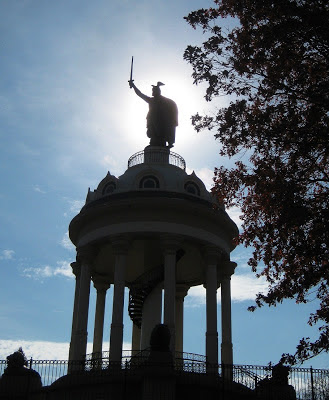In the year 9 AD the Roman Empire ruled all of the world that was worth having. This was under Augustus, who for sure would make anyone's top ten list of great rulers.
One of his generals, a chap named Varus, was a bit too casual about marching around in the forests of some disputed territory on the far side of the Rhine river. He and his three legions were ambushed and wiped out by a confederacy of German tribes that had united under a leader named Armin, or if you prefer the Latinized version, Arminius.
Arminius was quite the fellow. He was the son of a German chieftain, who joined the Roman army and rose to officer status before returning to his homeland. His uniting the fractious tribes for the battle of Teutoburg forest was remarkable-it is not easy to unite Germans on much of anything.
In any event, Augustus took this hard. He of course sent out punitive missions to slay anyone who seemed to have any culpability. (Arminus was killed in a local feud, because it is really hard to keep Germans united). Then the decision was made. The Empire would grow no further.
Most of his successors agreed, and Europe eventually evolved with a formerly Roman France and a formerly barbarian Germany grumbling at each other across the Rhine river, a boundary set by Augustus himself.
It took until the late 19th century before Germany overcame the petty squabbling business and united again under Otto von Bismarck. This prompted a renewed interest in their old pal Arminus, whose name had then been simplified to the easier to pronounce "Hermann". (supposedly it was Martin Luther who made the linguistic switcheroo).
A grand monument to Hermann was erected near where the battle of Teutoburg was felt to have happened.
 |
| image from Wikimedia, attribution: Apostaloff |
Meanwhile across the pond in the New World....the town of New Ulm, Minnesota was enjoying a post Civil War boom. Solidly German in its citizenry and proud of their military prowess in repelling a Sioux Indian attack, they thought the Hermannsdenkmal (denkmal translates literally to "a time to think") was a marvelous idea. They wanted one of their own.
A group was organized called "The Sons of Hermann" and the task was undertaken. It took a while but the project was completed in the 1880s. It is more or less a copy of the German original, but on an elevated base allowing a great view of the Minnesota river valley for those willing to pay a small fee to climb up there. It is said to not be a coincidence that a statue of St. Peter, representing Rome, is to be found on the nearby cathedral. Hermann has his sword held high in victory. Peter has his point down in defeat.
A few pictures of Hermann the German as he stands above New Ulm Minnesota. He faces east, so if he is watching for the Roman legions to come marching back for a rematch I guess he is looking in the proper direction. But the wide gulfs of time and of the Atlantic ocean probably mean that New Ulm will not have to endure another siege.
If you like that sort of thing, the original German version of the Hermannsdenkmal has some fascinating panoramic views. Lots of Hermann The website devoted to the monument somehow forgets to mention that it was a frequent target late in the war of allied figher bombers looking for something to strafe. I guess a hauty German holding a sword just was too tempting to pass up.
------------
Update 25 Jan, 2013. I rarely watch TV but caught a glimpse last week of a commercial. It appeared to show a "Sons of Hermann" lodge. It had a sort of Texas vibe to it...trucks and barbeque you know. It appears that at least in Texas, the Sons of Hermann is still a going concern! I got the impression that most branches got caught up in the whole anti-German sentiment wave of 1914 to 1918.


No comments:
Post a Comment